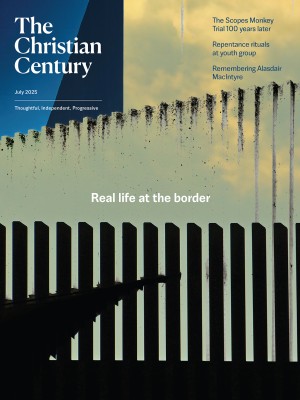The prophet Amos, an arborist and shepherd, speaks as a lightning rod to those who “trample on the needy” while calling themselves faithful to God. Speaking on God’s behalf, Amos declares that wrath awaits those who are negligent in their care for others. It’s a startling consequence for a nation of “rampant narcissism,” as Joan Chittister characterizes the United States in her book The Time Is Now.
This passage from Amos has a picturesque beginning. God places before Amos a basket of summer fruit—fruit that has warmed in the summer months and is now ripe. God asks Amos what he sees, and Amos replies, “A basket of ripe fruit.” Warm, fuzzy peaches and plump pears bursting with flavor, ready to exercise their purpose: to provide vitamins and other nutrients to energize people for living. If the fruit does not fulfill its purpose, it will soften, brown, bruise, and rot into the earth.
Read our latest issue or browse back issues.
As it is with God’s peaches and pears, so it is with God’s people. The time is ripe, warns the prophet; the time is now. God’s rage will not be held at bay. Do something with the energy I have given you. Give yourself to the hungers and needs around you, like a ripe, sweet, juicy peach is consumed at breakfast.
For all God has provided, the people are not living out their responsibility as human beings. They “bring to ruin the poor of the land” and show no concern for those who suffer. Through the prophet Amos, God interferes. God judges; God condemns. The people “practice deceit with false balances, buying the poor for silver and the needy for a pair of sandals.” God’s wrath will descend in the form of a famine unlike any other: “not a famine of bread or a thirst for water, but of hearing the words of the Lord.”
This February, The New York Times reported on the results of a comprehensive national study of the factors shaping America today, across the political spectrum. The report was compiled by 13 different scholars, all advisers to the past five presidents. According to the Times, the report concludes that the US economy “is performing better than any of its peers. . . . and remains far richer, per person, than China or India. The report also finds that the U.S. fares less well in almost every other realm, including health, happiness and social trust.”
A famine for the words of the Lord has struck our wealthy nation, as it did in the time of Amos. God’s anger is unleashed not only on behalf of those who suffer and are in need, not only because the people have been given more than enough and still do not share what they have but for a third reason: self-indulgent lives are unhappy and purposeless.
Writing in the eighth century BC, Amos addresses a central question of modernity: Why have health and happiness become unmoored from economic prosperity? Happiness is not found in building more to store more. Finding meaning, purpose, and happiness have to do with how we give from what we are given—both for the benefit of those in need and for the purposefulness that results from concern for others.
Jesus’ life was shaped by the prophets and psalmists who were comfortable with their anger, believers who saw resistance and protest as part of their job description. When something goes against the scriptural record of God’s intentions for people, they speak out.
Jesus grew up listening to the psalms. The psalmist’s accusation of neglect of the needy is not followed by “may God forgive you” or “try harder next time.” “God will break you down forever,” says Psalm 52. “He will snatch and tear you from your tent; he will uproot you from the land of the living.” What has happened to our angry voice?
Evangelical Christians, especially conservative politicians, have no hesitation in expressing anger or judgment over DEI, climate change, Social Security, public education, immigration, gender identity, anything that threatens their perception of what is right—they speak, spend money, organize, act, and vote.
As Chittister told Oprah Winfrey in an interview, a prophet is someone who refuses whatever does not align with God’s love: the unjust treatment of women, the abuse of nature, racial injustice, the neglect of those in need. She suggested that our anger might be God’s grace working in us: it can fuel our willingness to participate in important moral conversations. Chittister recommends that we simply say to each other, on any side of any argument, “I think differently than that”—and then engage.
The prophet Amos would agree: anger is grace and fuel.






